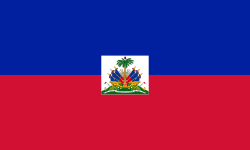This article relies largely or entirely on a single source .(January 2016) |
| Haiti at the 2015 Parapan American Games | |
|---|---|
 | |
| IOC code | HAI |
| NOC | National Paralympic Committee of Haiti |
| Website | http://www.paralympic.org/haiti |
| in Toronto 7–15 August 2015 | |
| Competitors | 1 in 1 sport |
| Flag bearer | Nephtalie Jn Louis (opening) |
| Medals |
|
| Parapan American Games appearances | |
Haiti participated in the 2015 Parapan American Games. [1]